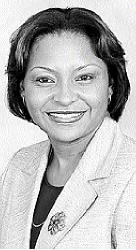LAWS OF EVE - Jurors under the microscope
Published: Monday | November 23, 2009

McGregor
According to Section 2 of the Jury Act, any person who resides in Jamaica and is aged 18 to 70 qualifies and is liable to serve on juries if the person's name is on any current official voters' list if the person is registered under Section 17D of the Revenue Administration Act.
Persons are not qualified to serve on a jury if they are:
Non-Commonwealth citizens
Unable to speak, read and write English
Awaiting trial in a Resident Magistrate's Court for an indictable offence
Awaiting the outcome of a preliminary inquiry into an indictable offence.
There is also a long list of persons who are exempted from serving on juries. This list includes judges and their spouses, students, practising attorneys-at-law, members and spouses of members of the Cabinet and Senate, medical practitioners, nurses and midwives.
It would be interesting to know how many persons remain eligible for jury selection after all the exemptions and exceptions are accounted for, especially because of illiteracy.
Recent report
The recent report that a juror arrested and charged for attempting to pervert the outcome of a trial in the Clarendon Circuit Court had previously sat on a jury that acquitted the same accused man could well be the result of the fact that the current system of selection leaves only a small group from which to choose. Perhaps this juror could also be one of the 'professional jurors', who are always readily available to sit on juries when those who have been called to serve fail to show.
Scenes from John Grisham's novel The Runaway Jury immediately came to mind as I read the report that the trial was aborted because two jurors had allegedly been caught accepting payment from the accused's mother.
This incident demonstrates the fallibility of our justice system, and many believe that it underscores the need for an urgent review of the jury system. In a country which is besieged by crime and violence, and where citizens are fearful to attend court as witnesses, or search for a myriad of excuses to avoid jury duty, it may be a timely reminder that there is a constant need for vigilance in ensuring that justice is being served in our courts.
Subject to amendments
The Jamaican Jury Act was enacted in 1898 and has been subject to amendments from time to time. However, the technological advancements of the last two decades are yet to impact the process of jury selection. Some persons have suggested that the database of taxpayer registration numbers should now be utilised in place of the voters' list, as that may increase the number of eligible jurors. Others have suggested that more critical measures ought to be explored for ensuring the integrity of the jury system.
This issue certainly demands prompt attention and careful deliberation.
Sherry-Ann McGregor is a partner and mediator with the firm Nunes, Scholefield, DeLeon & Co. Send feedback and questions to lawsofeve@yahoo.com or lifestyle@gleanerjm.com.


